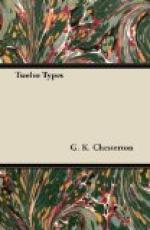The general attitude of St Francis, like that of his Master, embodied a kind of terrible common-sense. The famous remark of the Caterpillar in ‘Alice in Wonderland’—’Why not?’ impresses us as his general motto. He could not see why he should not be on good terms with all things. The pomp of war and ambition, the great empire of the Middle Ages and all its fellows begin to look tawdry and top-heavy, under the rationality of that innocent stare. His questions were blasting and devastating, like the questions of a child. He would not have been afraid even of the nightmares of cosmogony, for he had no fear in him. To him the world was small, not because he had any views as to its size, but for the reason that gossiping ladies find it small, because so many relatives were to be found in it. If you had taken him to the loneliest star that the madness of an astronomer can conceive, he would have only beheld in it the features of a new friend.
ROSTAND
When ‘Cyrano de Bergerac’ was published, it bore the subordinate title of a heroic comedy. We have no tradition in English literature which would justify us in calling a comedy heroic, though there was once a poet who called a comedy divine. By the current modern conception, the hero has his place in a tragedy, and the one kind of strength which is systematically denied to him is the strength to succeed. That the power of a man’s spirit might possibly go to the length of turning a tragedy into a comedy is not admitted; nevertheless, almost all the primitive legends of the world are comedies, not only in the sense that they have a happy ending, but in the sense that they are based upon a certain optimistic assumption that the hero is destined to be the destroyer of the monster. Singularly enough, this modern idea of the essential disastrous character of life, when seriously considered, connects itself with a hyper-aesthetic view of tragedy and comedy which is largely due to the influence of modern France, from which the great heroic comedies of Monsieur Rostand have come. The French genius has an instinct for remedying its own evil work, and France gives always the best cure for ‘Frenchiness.’ The idea of comedy which is held in England by the school which pays most attention to the technical niceties of art is a view which renders such an idea as that of heroic comedy quite impossible. The fundamental conception in the minds of the majority of our younger writers is that comedy is, ‘par excellence,’ a fragile thing. It is conceived to be a conventional world of the most absolutely delicate and gimcrack description. Such stories as Mr Max Beerbohm’s ’Happy Hypocrite’ are conceptions which would vanish or fall into utter nonsense if viewed by one single degree too seriously. But great comedy, the comedy of Shakespeare or Sterne, not only can be, but must be, taken seriously. There is nothing to which a man must give himself up with more




